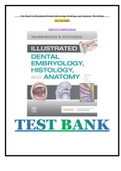Test Bank For Illustrated Dental Embryology Histology and Anatomy- 5th Edition
FULL TEST BANK
INSTANT DOWNLOAD
,Chapter 01: Face and Neck Regions
MULTIPLE CHOICE
1. Which of the following facial features is located laterally to each naris?
a. Orbit
b. Nasal ala
c. Nasal septum
d. Philtrum
ANS: B
The nares are separated by the midline nasal septum. The nares are
also bounded laterally by winglike cartilaginous structures, each ala
(plural, alae) of the nose. In the orbital region of the face, the eyeball
and all its supporting structures are contained in the orbit of the skull,
the bony eye socket. On the midline of the upper lip extending
downward from the nasal septum is a vertical groove, the philtrum.
REF: Chapter 1, Nasal Region, Page 2
2. The lips are outlined from the surrounding skin by a transition area
called the:
a. philtrum.
b. mucogingival junction.
c. mucocutaneous junction.
d. mandibular symphysis.
ANS: C
The vermilion zone of each lip has a darker appearance than the
surrounding skin, with the lips outlined from the surrounding skin by a
transition zone, the mucocutaneous junction. On the midline of the
upper lip extending downward from the nasal septum is a vertical
groove, the philtrum. The line of demarcation between the firmer and
pinker attached gingiva and the movable and redder alveolar mucosa
is the scallop-shaped mucogingival junction. The midline of the
mandible is marked by the mandibular symphysis.
REF: Chapter 1, Oral Region, Page 2
3. Which of the following structures can be palpated in the anterior
midline of the neck?
a. Thyroid cartilage
b. Parathyroid glands
c. Sternocleidomastoid muscle
d. Submandibular salivary gland
, ANS: A
Found in the anterior midline and inferior to the hyoid bone is the
thyroid cartilage, which is the prominence of the “voice box,” or larynx.
The vocal cords, or ligaments of the larynx, are attached to the
posterior surface of the thyroid cartilage. The parathyroid glands are
located close to or within the posterior aspect of the thyroid gland but
cannot be palpated in a patient; the thyroid gland can be palpated on a
patient within the midline cervical area. The large strap muscle, the
sternocleidomastoid muscle, is easily palpated on each side of the
neck. The submandibular salivary gland is in the neck region but not in
the midline.
REF: Chapter 1, Neck Regions, Page 8
4. Which of the following statements concerning the zygomatic
arch is correct?
a. The temporomandibular joint
is superior.
b. The infraorbital region is
inferior.
c. It overlies the mandible.
d. The external ear is posterior.
ANS: D
Farther laterally to the infraorbital region is the zygomatic region,
which overlies the bony support for the cheek, the zygomatic arch. The
zygomatic arch extends from just below the lateral margin of the eye
toward the middle part of the external ear, which is located posteriorly.
Inferior to the zygomatic arch and just anterior to the external ear is
the temporomandibular joint.
REF: Chapter 1, Zygomatic Region, Page 2
5. One of the muscles forming the cheek is the strong _____ muscle, which
is felt when a patient clenches the teeth together.
a. lateral pterygoid
b. masseter
c. medial pterygoid
d. temporalis
ANS: B
The buccal region of the face is composed of the soft tissue of the
cheek. The cheek forms the side of the face and is a broad area of the
face between the nose, mouth, and ear. Most of the upper cheek is
fleshy, mainly formed by a mass of fat and muscles. One of the
muscles forming the cheek is the strong masseter muscle, which is
palpated when a patient clenches the teeth together. The pterygoid
, muscles are also located on each side of the face near the mouth, and
the temporalis is located in the temporal region.
REF: Chapter 1, Buccal Region, Page 2
6. Just inferior to the zygomatic arch and just anterior to the external ear
is the:
a. temporomandibular joint.
b. infraorbital region.
c. mental region.
d. parotid gland.
ANS: A
Inferior to the zygomatic arch and just anterior to the external ear is
the temporomandibular joint. The infraorbital region of the face is
located inferior to the orbital region and lateral to the nasal region.
Farther laterally is the zygomatic region, which overlies the bony
support for the cheek, the zygomatic arch. The zygomatic arch extends
from just below the lateral margin of the eye toward the middle part of
the external ear. The chin is the major feature of the mental region of
the face; the bone underlying the mental region is the mandible, or
lower jaw. The parotid is located irregularly from the zygomatic arch
down to the posterior border of the lower jaw.
REF: Chapter 1, Zygomatic Region, Page 2
7. The _____ salivary gland is located irregularly from the zygomatic arch
down to the posterior border of the lower jaw.
a. parotid
b. submandibular
c. von Ebner
d. sublingual
ANS: A
The parotid is located irregularly from the zygomatic arch down to the
posterior border of the lower jaw. Both the submandibular salivary and
sublingual are in the neck region. The von Ebner refers to minor glands
located deep to the circumvallate lingual papillae on the dorsal surface
of the tongue.
REF: Chapter 1, Buccal Region, Page 2
8. The _____ extends from just below the lateral margin of the eye toward
the middle part of the external ear.
a. temporomandibular joint
b. zygomatic arch
c. labial commissure




